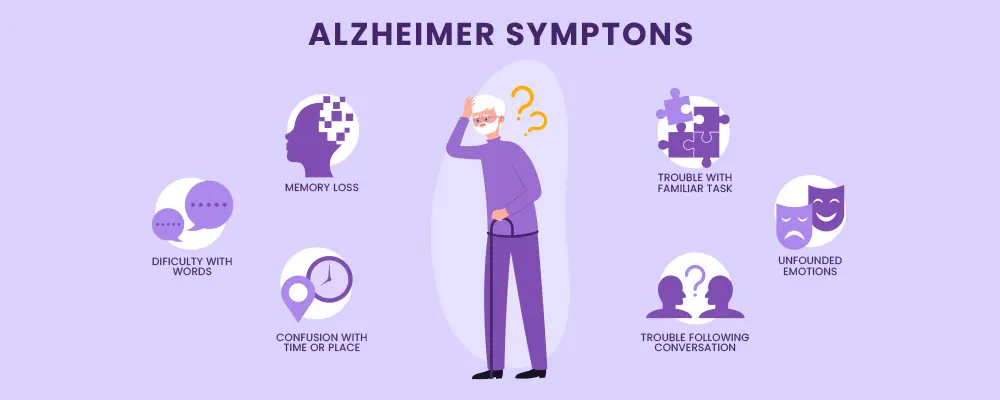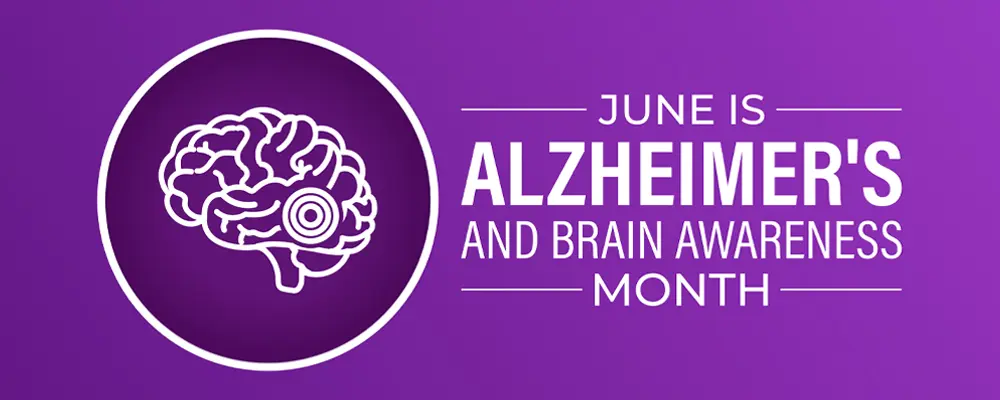June serves as Alzheimer’s and Brain Awareness Month. It offers a dedicated platform to not only raise awareness about Alzheimer’s disease and related dementias, but also to celebrate the remarkable human brain and its lifelong potential.
This year holds particular significance offering a glimmer of hope through ongoing Alzheimer’s Clinical Trials exploring potential treatments and preventative measures for Alzheimer’s disease.
Continue reading to understand the impact of this devastating condition and the steps we can take to raise awareness and support those affected by Alzheimer’s, including caregivers.
Understanding Alzheimer’s Disease
Alzheimer’s disease is a neurodegenerative condition that progressively causes the deterioration of brain cells. It is the most common cause of dementia, responsible for 60-70% of all cases. It is a condition characterized by a decline in cognitive function severe enough to interfere with daily life.
Key Characteristics of Alzheimer’s Disease

| Memory Loss | Initially, individuals might encounter challenges in recalling recent occurrences or discussions. As the disease progresses, memory problems worsen, and individuals may struggle to recall important dates, events, or even the names of close family members or caregivers. |
|---|---|
| Cognitive Decline | This includes difficulty with problem-solving, planning, and completing familiar tasks. Individuals may also have trouble understanding spatial relationships and visual images, leading to problems with driving or navigating their environment. |
| Communication Issues | People with Alzheimer’s may have trouble finding the right words, following or joining conversations, and might frequently repeat themselves. |
| Behavioral Changes | Mood swings, depression, social withdrawal, and changes in personality and behavior can also occur. Individuals may become confused, suspicious, or fearful and may exhibit changes in sleep patterns. |
Risk Factors for Alzheimer’s Disease
Alzheimer is a complex condition, and the exact causes remain under investigation. However, there are several established risk factors that can increase a person’s likelihood of developing it.- Age: As people get older, their risk of developing the disease increases significantly. It increases twofold every five years following the age of 65.
- Family History: Having a close relative with Alzheimer’s disease increases your risk.
- Genetics: Inheriting certain genes can raise your chances of developing Alzheimer’s. However, having these genes doesn’t guarantee you’ll develop the disease, and not having them doesn’t eliminate the risk entirely.
- Cardiovascular Health: Conditions that affect heart health, such as high blood pressure, high cholesterol, and diabetes, are also risk factors for Alzheimer’s.
- Lifestyle Habits: Smoking, excessive alcohol consumption, and physical inactivity can all increase your risk of Alzheimer’s.
- Cognitive Decline: A history of mild cognitive impairment can be an early warning sign of Alzheimer’s disease.
- Head Injury: A history of severe head injury may increase the risk of developing dementia, including Alzheimer’s.
What is the Purpose of Alzheimer’s and Brain Awareness Month?
Alzheimer’s and Brain Awareness Month fosters public understanding about Alzheimer’s disease and its impact on individuals, families, and communities.- It provides a chance to educate people on the signs and symptoms of the disease, its risk factors, and the importance of early detection and diagnosis.
- This month also focuses on promoting research into the causes, treatments, and potential cures for Alzheimer’s. It serves as an opportunity to raise funds for research and support services for those living with Alzheimer’s and their families.
- Alzheimer’s Awareness Month aims to reduce the stigma and discrimination associated with Alzheimer’s disease.
How can we Support Alzheimer’s and Brain Awareness Month?
There are many ways to get involved and show your support during Alzheimer’s and Brain Awareness Month.- Volunteer: Volunteering with an organization dedicated to Alzheimer’s disease is a meaningful way to make a difference. Consider offering your time at a local Alzheimer’s Association chapter or another advocacy group to help raise awareness, support families, or assist with fundraising events.
- Donate: Contributing to organizations focused on Alzheimer’s research and support services can fund vital research and assist those affected by the disease. Consider making a one-time or recurring donation to support ongoing efforts.
- Participate in Fundraising Events: Many organizations organize fundraising events to support research and awareness initiatives. Consider joining activities such as walks, runs, or galas to show your support and help raise funds.
- Spread awareness: Sharing information about Alzheimer’s disease can help raise awareness and reduce stigma. Share articles, personal stories, or resources on social media using relevant hashtags to contribute to the cause.
Steps Towards Safeguading the Brain
Alzheimer’s and Brain Awareness Month presents a valuable opportunity to take concrete steps towards safeguarding our brains. Some key actions we all can take are:- Engaging in activities that challenge the mind, such as learning a new language, playing brain games, or reading.
- Choosing a balanced diet rich in fruits, vegetables, and whole grains, which can provide essential nutrients for optimal brain function.
- Exercising regularly to strengthen the heart and vascular system, positively impacting blood flow to the brain.
- Taking 7-8 hours of quality sleep each night, as sleep plays a crucial role in memory consolidation and cognitive processing.
- Cultivating strong social interactions that can benefit mental well-being and cognitive function.
- Consulting with a physician if you are experiencing symptoms of Alzheimer’s disease, such as memory loss, or confusion.




